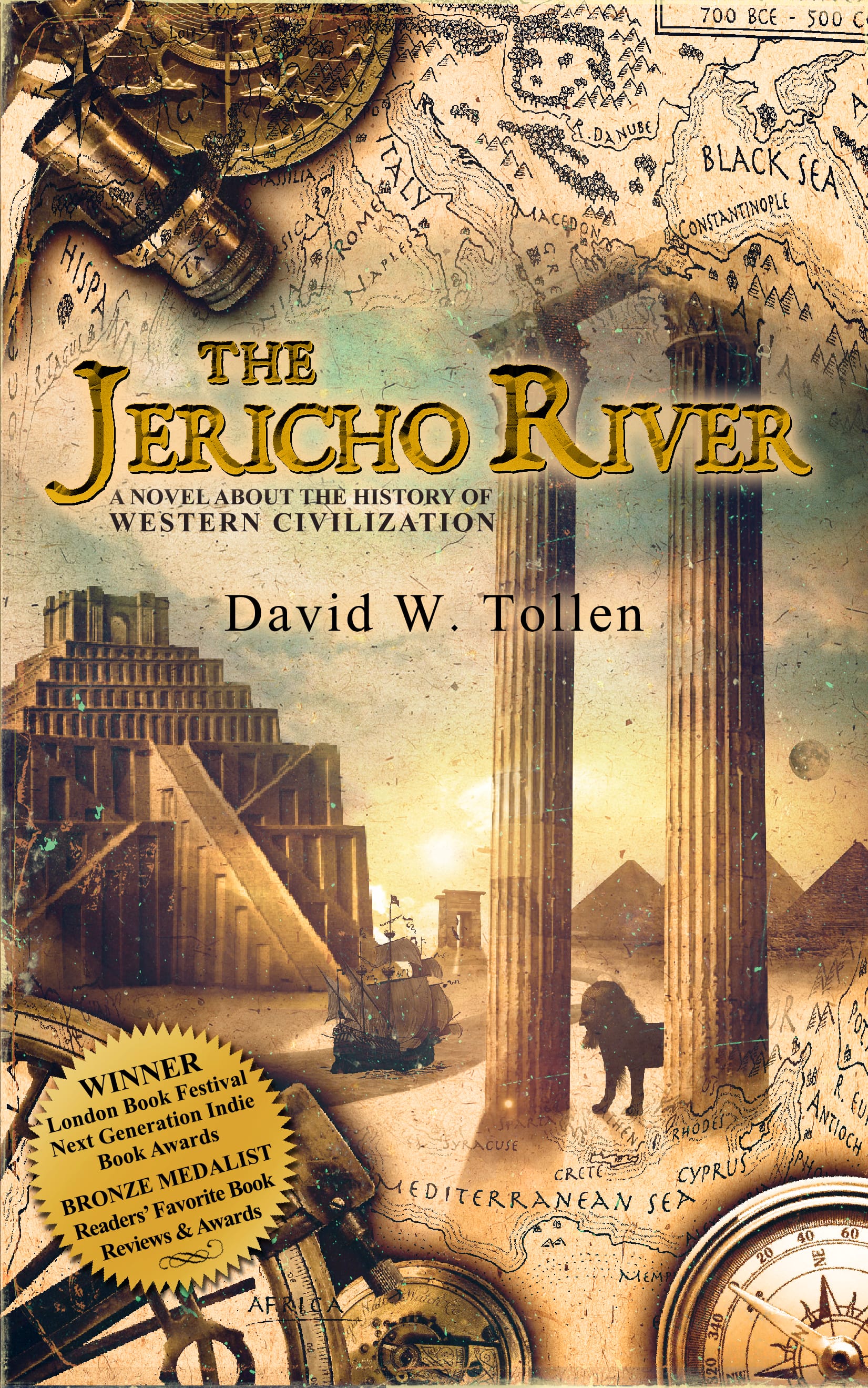The Jericho River: A Novel About the History of Western Civilization is a novel from David W. Tollen that’s won a whole bunch of awards (London Book Festival, Next Generation Indie Book Awards, et al) and which should appeal to RPG fans.
The novel sets about presenting history as an adventure story. The Jericho River runs through a world shaped by myth and history. In this adventure Jason Gallo sails along it in search of his estranged father, battling pirates and monsters on the way.
The river flows like a timeline, carrying Jason along in chronological order and so traces the history of Western Civilization. The notes at the bottom of the page are from Jason’s father, Professor Gallo, and shed light on characters like King Arthur, the origins of Snow White, coffee and even the Internet.
Captive aboard the Dead Valencia
Jason woke to the sound of smacking and slurping. He grunted and looked up, knocking his head against the Dead Valencia’s mast. “Uuuuhh,” he moaned. He’d slept sitting up, tied to the mast. Sore muscles screamed as he stretched his neck.
Then his eyes snapped open wide as he realized he had company, and that his companion was not Rim-Hadad. Morning sunlight revealed an enormous, dirty bird, like a vulture, sitting on the deck. Its sharp black talons were shoving strips of dried meat into its mouth. But that mouth had no business on a bird. It was a human mouth, with yellow, crooked teeth. The vulture had the head of a hideously ugly woman, with matted straw-colored hair and beady, gleaming eyes.
“Who are you?” Jason gasped.
“Shhh,” the bird-woman responded without looking up. “Your big friend will hear. He’s over in the trees, doing his business.”
Jason looked around. The Dead Valencia bobbed next to a bare, rocky outcropping. Acacias and oaks covered the shore, except where the rocks jutted into the river. Jason couldn’t see Rim-Hadad.
He turned back to the bird-woman and whispered: “Have you come to help me?”
“No,” she whispered back, still eating.” I heard your call, but I don’t get involved with strangers. I came to see if you had anything good to eat.”
Jason stared. This was his lumin rescue? “But—but did you understand why I called? I’m an enemy of the Aristotle Academy. Aren’t you their enemy, too?”
“No.” She smacked her lips and sucked on a talon, almost finished with the meat. “I don’t care about them one way or the other.”
Jason’s heart sank. “But I heard there was a fight between the lumins and the Aristotle Academy.”
“There is.” The bird-woman belched quietly, sending the stench of rotting meat into the air. “Some lumins fight back, along with a lot of humans, shamans and otherwise. But it’s nothing to do with me. Harpies don’t get involved in politics and great struggles.”
“Great. A conscientious objector.” Jason looked around, thinking of the harpies in the Golden Fleece and the other Greek myths his father had told.1 Did the stories mention any way to sweet talk a harpy? His mind was blank. “Look, I don’t need you to get involved. Just untie me. I’ll take it from there.”
The meat was gone, but the harpy didn’t look satisfied. “I’m not too good with ropes.” She held up a scaly bird foot, flapping her wings for balance. “And like I said, I don’t want to get involved.”
Jason sighed as the harpy hopped toward the stern, sniffing the deck. “The food’s in the hold,” he said, “underneath.”
“I know,” she said. “That’s where I got the meat. But all you’ve got left down there is bread, and I was hoping for more flesh. Is there another hold?”
“No.” Jason hoped Rim-Hadad had gone off a good way and had some serious business to do in the woods. “Look, can you just help me a little bit?” He looked around the sunlit deck, trying to think what he could offer. “If you do, I’ll personally see to it that you get something out of it—like a big meal. How about that? I’ll get you steak and leg-of-lamb and bacon and … whatever. Please.”
She hopped close to him. He tried not to cough at her stench—like chicken dung mixed with halitosis.
“You’re making that up,” she croaked, “but I forgive you because you’re a handsome thing.” She tilted her head. “I couldn’t untie you, but I suppose I could find someone who will, someone who’s fighting the Aristotle Academy.” Yellow teeth gnawed at her lower lip. “I’ll do it on one condition.”
“Anything.”
“You have to give me a kiss.”
“What? A kiss?”
“Yes.” One foot suddenly shot into her matted hair and then reemerged, pincer-like talons holding a squirming louse. The harpy popped it into her mouth before Jason could blink. He recoiled as she continued: “And I want a real kiss, not just a peck on the cheek.”
Jason gulped. “Now?”
“No time like the present.” Before Jason could speak, the harpy had hopped forward and her clammy lips were on his. He spluttered and tried not to retch at the nasty, wet kiss. He half expected the harpy to turn to a princess, or himself to a frog.
“You have a sweet kiss,” she said with a yellow, toothy smile when it was over, “like a blooming honey-lotus, as the poet says.2 I know where to find the Academy’s enemies. I’ll tell them.”
“P-p-please, tell them we’re headed for Athenopolis,” he sputtered. “And tell them they’ve gotta hurry!”
“I will.” She winked, and then with a flutter of dirty feathers, she leapt into the air. Jason did not start spitting until she was out of sight.
© David W. Tollen. All rights reserved.
1 Most of the myths we know were told by Iron Age Greeks about their Bronze Age, Mycenaean ancestors. To the latter-day Greeks, the Bronze Age was the time of myths and heroes. And those myths were about all the Iron Agers remembered about the Mycenaeans, thanks to the long, awful dark age separating them in time. In fact, the latter-day Greeks thought cyclopes had built the walls lying in ruins at the old Mycenaean palace sites.
~ William Gallo, Lectures, History 78.
2 Sappho was one of Greece’s greatest lyric poets and also one of its few career women. She came from the isle of Lesbos, and she wrote a bunch of love poems to women, which led to the modern meaning of the word “lesbian.”
~ William Gallo, Historical Factoids, 49.


